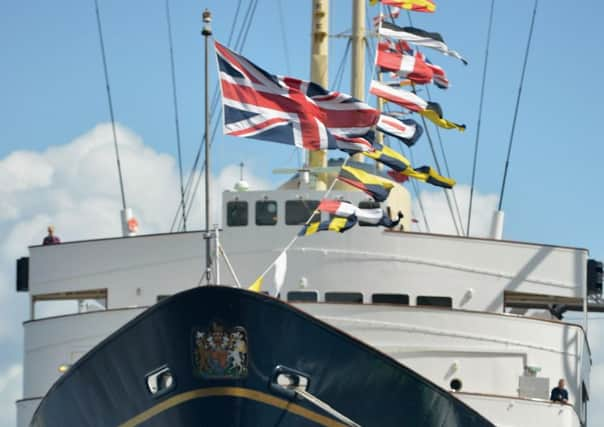Martyn McLaughlin: Tory Britannia dream shows they are all at sea


The late Russian scholar and playwright, Svetlana Boym, once identified two strains of nostalgia. The first, called reflective, she regarded as a gentle, inoffensive condition, borne from a longing of what has gone before, yet tempered by an acceptance that the past is irretrievable.
The second blend, known as restorative nostalgia, is not nearly so meek.
Advertisement
Hide AdAdvertisement
Hide AdIt rails against the passing of the seasons, seeking to bend chronology to its will. Those afflicted try to reconstruct emblems and rituals of home and homeland in an attempt to conquer time. “It does not think of itself as nostalgia,” Boym wrote, “but rather as truth and tradition.” The outbreak of the latter form across the Conservative benches in recent weeks ought to demonstrate its contagiousness. The host for this malady is unclear, but if the chief whip wishes to prevent an epidemic, he could do worse than to quarantine Boris Johnson.
Assessing the foreign secretary’s state of mind is like working out the molecular structure of jelly, but even by his capricious standards, he appears hopelessly in thrall to the mythic concept of a bygone golden age that is animating his party’s resurgent traditionalists.
Now that the modernisers have been consigned to oblivion, the dewy-eyed are enjoying an open season. Some proposals, such as the return of grammar schools, are contentious and misguided, yet they at least have one foot in the present.
Reality and Mr Johnson, however, have never quite got on. For a while, they slept in separate beds and exchanged pleasantries over breakfast. But their separation is now absolute. Mr Johnson has been consigned to the shed at the foothills of the garden, where he can conjure up his absurd notions undisturbed.
How else to explain his backing for the proposal to recommission the Royal Yacht Britannia as a seafaring symbol of British might in the fractious post-Brexit trade talks to come? The plan may have been devised by backbencher Jake Berry, but Mr Johnson has made plain his support, to the extent that he is now the cheerleader for a campaign that resembles the product of a focus group of syphilitic retired admirals playing word association over a bottle of Courvoisier.
A friend of the foreign secretary – anonymous, of course – told The Sun newspaper that “Boris is certainly intrigued.” Presumably, this is down to the long-standing tradition which refers to boats as “she”. Even so, the idea of Britannia remaining in situ in Leith clearly aggravates Mr Johnson, who views his unexpected elevation to Prime Minister Theresa May’s cabinet as an opportunity to emulate Sir Francis Drake.
A sorry band of former trade ministers, royal aides and military top brass have been defumigated in an attempt to lend credence to the venture. Mr Johnson’s predecessor but one, William Hague, authored a sepia-tinged lament for entrées past, recalling an evening where he wined and dined the CEOs of major US firms on board Britannia. “Virtually every one of them came,” he observed, in the manner of the diary entry of an unpopular school child whose parents threw him a birthday party at Alton Towers in a desperate bid to shore up the numbers.
Mr Hague’s unchecked wistfulness saw him call not only for a return of these floating jollies, but an expansion of them. In future, he suggested, foreign investors could be invited to meet “not only ministers, but also some of the great entrepreneurs and sporting superstars that make us proud Britons in the 21st century.” If the UK government does not take him up on the idea then a reality show producer at Channel 5 surely will.
Advertisement
Hide AdAdvertisement
Hide AdThe subtext to Mr Hague’s piece is a reawakening of Britain’s dormant “soft power”, a spurious and obsolescent concept that is conveniently impossible to quantify. Mr Berry has suggested that up to £3bn in trade deals were signed between 1991 and 1995 off the back of the Royal Yacht’s overseas trips, but such claims are overcooked.
Between 1989 and 1996, the year before it was decommissioned, only 63 days in total were devoted to trade promotion aboard the Britannia. It exists only as a symbol. But for Mr Johnson and his ilk, symbolism is sufficient.
It is the same maudlin doctrine which gave rise to the crusade to reinstate the traditionally dark blue coloured British passports. What follows next is anyone’s guess, but expect campaigns to reinstate the birch, Concorde, Terry’s Pyramints, It Ain’t Half Hot Mum, incandescent lightbulbs, the three day week, and capital punishment.
Over a decade has passed since David Willetts cautioned his party against drifting into “bring backery”, the political equivalent of comfort eating. “We should remember the warning that trying to restore an abandoned tradition was like a man trying to repair a broken cobweb with his bare hands,” he said.
As the echoes of Empire fill the vacuum of post-Brexit planning, his counsel remains relevant. It will, however, go unheeded. The EU referendum vote demonstrated that reminiscence, no matter how illusory, is a powerful force, and Ms May looks intent on exploiting it.
If there is hope, it might come in the form of old remedies. In the 17th century, Swiss physicians used to treat nostalgia using purging, opium, leeches, or in extreme cases, “warm hypnotic emulsions.”
It may seem unduly cruel to submit Mr Johnson to such barbaric treatments, but given he survived his initiation to the Bullingdon Club, he might find comfort in their familiarity. After all, a love for tradition has never weakened a nation.
